Brazil's indigenous women protest against Bolsonaro policies
Hundreds of indigenous women occupied a building of Brazil's health ministry in the capital, Brasília, on Monday to protest against the policies of far-right President Jair Bolsonaro.

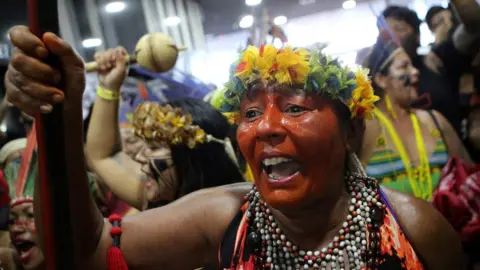 Reuters
Reuters
The group of some 300 protesters demanded better healthcare for indigenous people, especially women, and condemned proposed changes to how these services are delivered.
The Bolsonaro government wants to make towns and cities responsible for providing medical services to indigenous people, and community leaders fear local authorities lack the infrastructure and specialised units required.
The federal government is currently in charge of healthcare, and indigenous communities are visited by specially trained professionals.

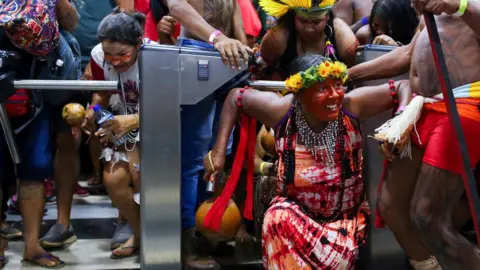 AFP
AFP
The protesters, who are in the city for the first March of Indigenous Women, sang and danced inside and outside the building of the Special Secretariat of Indigenous Health, known as Sesai.
"We've been left abandoned. They treat indigenous people like animals," 43-year-old Teresa Cristina Kezonazokere told Correio Braziliense newspaper (in Portuguese).
The demonstration ended almost 10 hours later, when Health Minister Luiz Henrique Mandetta said he would talk to some of their leaders. There were no reports of violence.

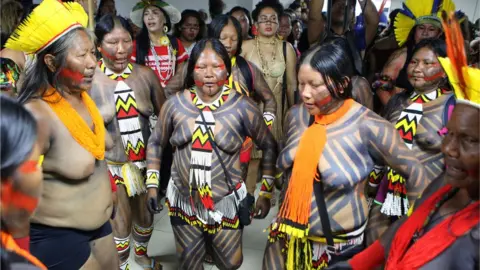 Reuters
Reuters
Organisers say the event in Brasília aims to highlight the role of women in indigenous communities. On Wednesday, some 1,500 indigenous women from 110 ethnic groups are expected to join a protest to defend rights they say are under threat under Mr Bolsonaro.
"We don't have to accept the destruction of our rights," said indigenous leader Sônia Guajajara.

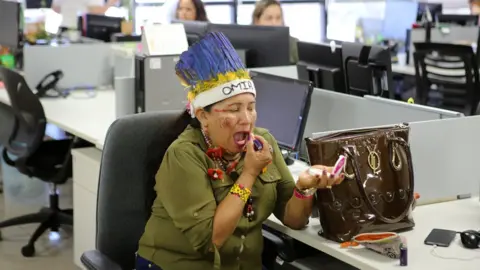 Reuters
Reuters
The president has promised to integrate indigenous people into the rest of the population and repeatedly questioned the existence of their protected reserves, which are rights guaranteed in the country's constitution.
Mr Bolsonaro, who supports policies that favour development over conservation, says the indigenous territories are too big in relation to the number of people who live there and has promised to open some of them to agriculture and mining.

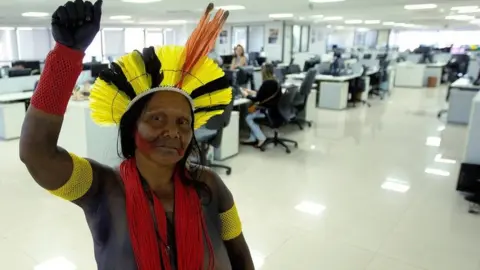 EPA
EPA
More than 800,000 indigenous people live in 450 demarcated indigenous territories across Brazil - which cover about 12% of land. Most are located in the Amazon region and some people live totally isolated.
Critics say Mr Bolsonaro's positions have encouraged illegal mining and invasions of reserves. Last month, an indigenous leader was stabbed to death, reportedly by heavily armed gold miners who had invaded a remote indigenous territory.

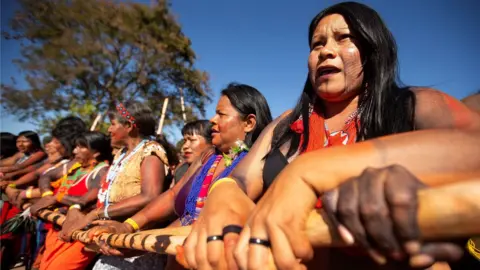 EPA
EPA
Meanwhile, deforestation in the Amazon, the world's largest tropical rainforest, soared more than 88% in June compared with the same month a year ago, according to data from Brazil's National Space Research Institute, Inpe.
But Mr Bolsonaro, who took office in January, has accused the institute of lying about the scale of the deforestation, and earlier this month sacked its head, Ricardo Galvão.
The president and his ministers have also criticised the country's indigenous rights agency, Funai, and its environmental protection body, Ibama.


All pictures subject to copyright.
